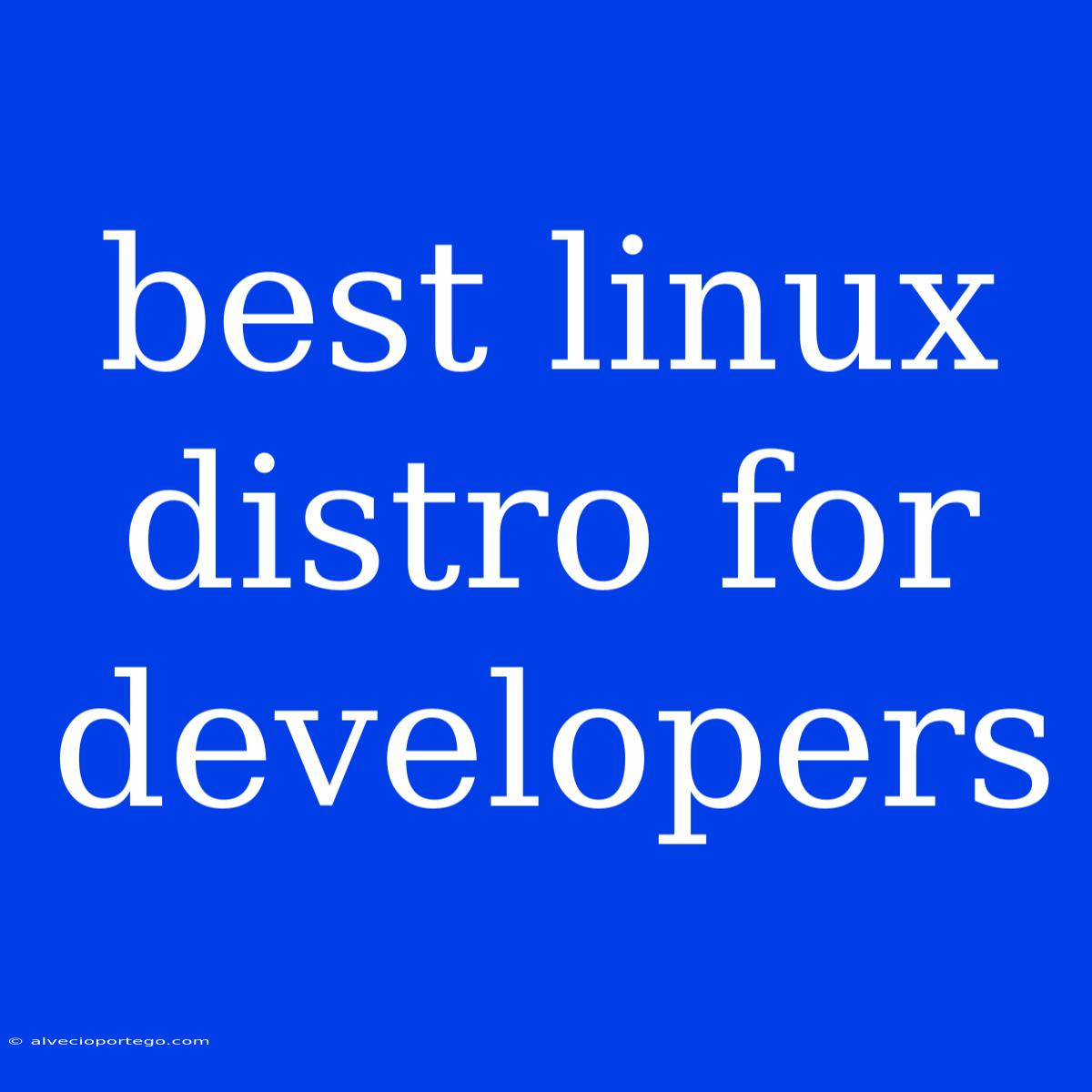Finding the Perfect Linux Distro for Developers
Choosing the right Linux distribution can be a daunting task, especially for developers. With so many options available, it's important to consider your specific needs and preferences. This guide will explore some of the best Linux distros for developers, highlighting their strengths and weaknesses.
Distros Focusing on Developer Tools
1. Ubuntu:
- Pros:
- User-friendly: Ubuntu is known for its approachable interface and extensive user base.
- Vast software repository: The Ubuntu Software Center offers a wide range of development tools, libraries, and applications.
- Active community: Ubuntu boasts a vibrant community that offers support and resources.
- Cons:
- Bloatware: Ubuntu can include pre-installed applications that might not be needed by all developers.
- Can feel less customizable: While customization options are available, Ubuntu leans towards a more streamlined user experience.
2. Fedora:
- Pros:
- Bleeding-edge technology: Fedora incorporates the latest software and technologies, making it ideal for those who want to work with the newest releases.
- Strong emphasis on security: Fedora prioritizes security and stability, featuring advanced security features.
- Open-source and community-driven: Fedora is highly customizable and benefits from a large and active community.
- Cons:
- Can be less stable: The bleeding-edge nature of Fedora may lead to occasional stability issues.
- Requires a more advanced user: Fedora can be more demanding for novice users.
3. Debian:
- Pros:
- Stable and reliable: Debian is known for its rock-solid stability and long-term support.
- Widely used in enterprise environments: Debian's stability and security make it a popular choice in enterprise settings.
- Large software repository: Debian has an extensive software repository with a wide selection of development tools.
- Cons:
- Slow updates: Debian's focus on stability can result in slower update cycles.
- Can feel outdated: Debian may lag behind other distros in terms of incorporating the latest software versions.
4. Arch Linux:
- Pros:
- Ultimate customization: Arch Linux offers the ultimate degree of control and customization, allowing you to tailor the system to your specific needs.
- Cutting-edge software: Arch Linux incorporates the latest software versions and is frequently updated.
- Powerful package manager: The pacman package manager is fast, efficient, and easy to use.
- Cons:
- Steeper learning curve: Arch Linux is considered a more advanced distribution that requires a greater understanding of Linux concepts.
- Less beginner-friendly: The setup process and maintenance of Arch Linux can be challenging for new users.
5. Gentoo:
- Pros:
- Fine-grained control: Gentoo offers the most granular control over the system, allowing for precise optimization and configuration.
- Extreme customization: You can customize every aspect of Gentoo, from the kernel to the applications.
- Performance optimization: Gentoo's source-based approach enables you to build packages optimized for your specific hardware.
- Cons:
- Time-consuming installation: Gentoo's installation process is known to be complex and time-consuming.
- Requires advanced knowledge: Gentoo demands extensive technical expertise and is not recommended for beginners.
Distros with Specific Development Focus
1. Linux Mint:
- Pros:
- Easy to use: Mint aims for a user-friendly experience, making it ideal for developers transitioning from other operating systems.
- Focus on desktop environments: Mint offers various desktop environments, allowing you to choose the one best suited for your workflow.
- Wide compatibility: Mint is known for its broad compatibility with hardware and software.
2. Manjaro:
- Pros:
- User-friendly and stable: Manjaro combines ease of use with excellent stability.
- Rolling release model: Manjaro is constantly updated with the latest software releases.
- Beginner-friendly: Manjaro is considered a more accessible option for new Linux users.
3. elementary OS:
- Pros:
- Elegant and polished design: elementary OS boasts a visually appealing and user-friendly interface.
- Focus on simplicity: The operating system is designed with simplicity and user experience in mind.
- Solid performance: elementary OS provides a smooth and responsive user experience.
4. Kubuntu:
- Pros:
- KDE Plasma desktop environment: Kubuntu features the powerful and customizable KDE Plasma desktop.
- Extensive customization options: KDE provides a vast array of settings and configuration options.
- Powerful development tools: Kubuntu includes a comprehensive set of development tools and utilities.
5. Xubuntu:
- Pros:
- Lightweight and resource-efficient: Xubuntu uses the Xfce desktop environment, known for its minimal resource consumption.
- Fast performance: Xubuntu excels in providing a snappy and responsive user experience on older or resource-constrained systems.
- Suitable for virtual machines: Xubuntu's lightweight nature makes it a good choice for development environments within virtual machines.
Conclusion
The best Linux distro for developers depends on individual needs and preferences. Consider factors like user-friendliness, development tools, stability, and customization options. Experiment with different distros to find the one that best aligns with your development workflow.

